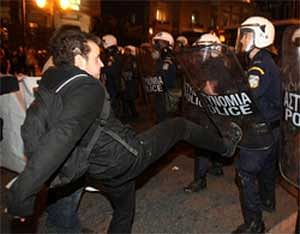

Talks to secure up to 120 billion euros ($160 billion) in European Union and IMF aid to Athens in return for draconian budget cuts are expected to wrap up by the end of Saturday, with European banks expected to contribute.
Eurozone finance ministers are then set to discuss Greece's debt crisis on Sunday. Many believe that while the measures are enough to stop the crisis from sinking other fragile EU ecnomies, the future remains stormy as there is increasing public resistance from the public to more cuts.
According to a recent poll, more than half of Greeks say they will take to the streets if the government agrees to new austerity measures.
In response to the public service cuts demanded from the average Greek, tens of thousands are set to strike across the country on Saturday, cutting off sea transportation between islands and the country's main railway system.
Shops remained closed for the day while hospitals operated with emergency staff as doctors joined the walkout.
Union leaders said the EU-IMF team has asked to scrap salary bonuses that are worth two months' wages, impose a three-year pay freeze, raise the value added tax from 21 to 23 percent, increase the retirement age from 62 to 67, as well as a public sector hiring freeze.
Greek Prime Minister George Papandreou said Friday painful cuts were "necessary for our country's protection, for our future, for us to be able to stand on our feet".
Athens insists it needs help by May 19, the day it is expected to issue a 9-billion-euro bond issue to refinance its debt, in order to avoid a default that could spread to other eurozone countries with immediate deficit crises, such as Portugal and Spain.
But unions, already reeling from austere budget cuts, have called a new round of strikes from May 5 to protest against cuts foreseen for 2011 and 2012, saying they impose most of the sacrifices on low to middle income workers.
The public sector union ADEDY, which represents half a million workers, has also called a 4-hour strike for Tuesday, on top of a nationwide strike already decided for Wednesday.
Greek authorities aim to achieve 24 billion euros of spending cuts, lowering the deficit by 10 percentage points, currently standing at almost 14 percent of gross domestic product (GDP).
That is almost five times the 3 percent level foreseen by eurozone rules, which are regularly flouted by its members.
The spiralling crisis, which saw the euro fall against the dollar amid credit rating downgrades for Greece, Portugal and Spain - led Germany to finally bow this week to international pressure to speed up the rescue operation.
Berlin initially held a tough stance, especially since bailing out profligate Greeks is unpopular amongst German voters and may hurt Merkel's centre-right coalition's chances in the May 9 state election in North Rhine-Westphalia.